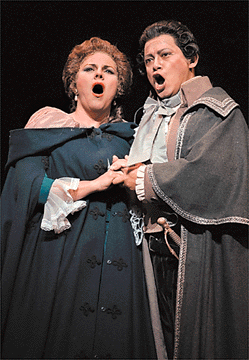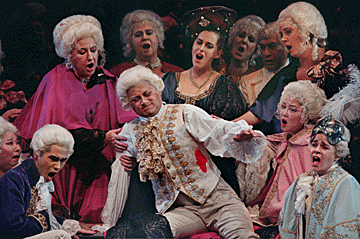


Why opera?
Because they wear yak hair,
By Ruth O. Bingham
and nine other reasons
Special to the Star-BulletinThe 1999 Hawaii Opera Theater season opens tomorrow, and opera buffs are all a-quiver. Those who have never attended an opera, however, may be wondering what the fuss is all about, and most of all, why opera? Afficionados effuse dozens of reasons to give it a try; we'll list but 10.
It's the IN thing
"Opera is the fastest growing art form in the United States," HOT marketing director Lili Meagher says. "It's a wonderful excuse to buy a new dress," quips Marilyn Trankle, HOT's development coordinator. "It's the most exciting show in town; it makes me laugh, it makes me cry."And there's nothing quite like the excitement of a HOT date, according to Meagher, "We've got dance, the whole orchestra, the acting, everything, you name it!"
It's the ultimate in fancy nights out, opulent Western decadence and conspicuous consumption of culture-with-a-capital-C.
Or, as general and artistic director Henry G. Akina states quietly, "Spectacle has always been with opera. It is total theater."
The music is sublime
Opera is human emotions come to life, and its music expresses our most profound feelings in a way that words alone never can.This season presents Verdi's "A Masked Ball" from 1859, Richard Strauss's "Elektra" from 1909 and Bellini's "Norma" from 1831. All, Akina notes, are "important turning points in opera ... and in musical history."
Akina, also the stage director for "Elektra," summarizes the season:
" 'Elektra' is the length of a movie. It's ... got blood and gore and very exciting theater. It's not full of pretty Italian arias." "Elektra" runs about 1-1/2 hours with no intermission.
On the other hand, Akina says, the entrancing music of "Norma" is a bel canto (a beautiful, lyric singing style). " 'A Masked Ball' is kind of everything that opera does, including the kitchen sink, if you will."
The latter two operas are about three hours long.

"Elektra's" more demanding music and challenging drama can be intimidating, Akina says, and it has never been done here. "We've done all the other early Strauss operas ... and I think 'Elektra' is the last one within our grasp, and so I think it behooves us to present that to the audience, to let the audience decide where it stands."Do you want to leave humming? Or do you want the gripping, the more action part of it? You have to make that choice before you come."
The voices!
"We're going to hear some of the finest voices in the world on our stage," Meagher says.
For 'Elektra,' that means "two absolute experts," Akina says: Janis Martin and Ruthild Engert. Audiences may also recognize local singers, including John Mount, Leda Asher Yager, Erik Haines, Quinn Kelsey and Laurence Paxton, as well returning favorites such as Warren Mok, Pamela South, Maria Russo and Sharon Spinetti.
Opera offers a rare opportunity to hear the natural human voice and what it can do. The performers sing without microphones, Akina says. "Blaisdell has excellent acoustics. Sometimes people get confused because we have a monitor for the sound people, and we have some floor mikes on the stage. (But) that takes sound away, it doesn't bring sound back into the auditorium."
See your friends
In the HOT Chorus, directed by Nola Nahulu, Beebe Freitas and Susan McCreary, you may see your dentist or your child's teacher. "I don't know of a chorus this committed, and they (rank) with many professional choruses on the opera stage," Akina says. "I think it's still one of the great accomplishments of the chorus, that this remains a volunteer activity and yet has such a high standard of quality."Generations of children have grown up in the chorus, Akina said, and some are beginning to show signs of being "pretty major soloists, at least in this community, and maybe outside of it."
A visual treat
You might get to see what has kept your neighbor so busy lately. Legions of volunteers put in innumerable hours building sets, tailoring costumes, gathering props, crocheting wigs and so on.Although the set for "A Masked Ball" is rented, those for "Elektra" and "Norma" were designed by Peter Dean Beck from New York, who also designed the lighting for all three, and were built here.
"A number of his sets that he's designed for HOT have made their way across the country backward to New York," Akina says.
And opera delights in special effects: "Where else can you see ... snow in Honolulu?" he asks (it will snow during "Norma").
Typical for opera, the rented costumes are sumptuous: gold braid, rich brocades, antique lace, velvet. "Some of those ball gowns are worth thousands of dollars," Meagher said.
Quilted undergarments, a velvet gown and a full-length woolen coat add up: They are often hot and heavy. Very heavy. It's not unusual to find singers gushing over a pretty costume, only to find the bad news is, "I gotta wear that costume!" Meagher said.
HOT builds its own wigs, crocheting hairs individually to a kind of netting, called lace. In this season's operas, there are wigs that are meant to look like wigs, wigs meant to look like powdered hair, and wigs meant to look like natural hair, all designed by Richard Stead. Some wigs are made of human hair, but many use bleached yak hair -- it has more body.
Remember that and try to guess which heads on stage are wearing wigs. Bet you can't.
The stories are wild
Murder, mystery, mayhem, matricide and more! Following the HOT season, you'll know how soap operas got their name. Opera plots stem from history, mythology, legend and literature, as well as imagination and are a great way to explore those tales in depth."The scope of the music really lets your dark side run free," Akina promises.
"There's great drama in 'Elektra.' The music is so much part of our early century, and yet the story is really out of the bowels of classical mythology and really one of the most important stories to come out of the Trojan War.
"I've made this a little more Greek than most productions, just to get that connection, so that the new part of it is the music."
You don't have to learn a foreign language
"Projected subtitles allow everybody to understand what's happening," according to HOT's education manager Erik Haines.Simultaneous translations prepared by Matthew Lata and Ann Ogino are projected above the stage. Leave your flashlight for reading the program at home, relax and enjoy the show.
Quality control
"It would be a lie to say we produce on the same scale as Berlin or the Met," Akina said. "Having said that, I think we could easily hold our own with any opera company on the mainland, and in many cases surpass some of the production standards of larger houses."Meagher adds, "I think that people who travel and see opera other places are the first to come back and say it's really very well done here."
The price is right
"Compared to the mainland we're very competitively priced, with our cheapest ticket at $23 and our most expensive at $77," Meagher says. "Our $77 is equivalent to $120 for downstairs, on the side in San Francisco. I know because I paid it recently. The family went and it broke me!"As we point out to students, (our tickets) are cheaper than the rock concerts they're going to. Senior citizens often ask, 'Do you have a discount?' We say, 'Yes! The whole back three sections are discounted very, very heavily.' We are trying to appeal to everybody."
Food for mind and soul
"Opera started out as a very academic discipline, but it also married very quickly with the theater of the people," Akina says. "Opera really reflects one of the highest forms of community"I am very anti-elitist (but) I also believe that the opera shouldn't pander, in the sense that being for everyone does not mean that we then make the opera like 'Les Miserables' or a Michael Jackson concert ... It means that we will open it and hope that people come to what it is, and do our best at delivering quality."
The season
A Masked Ball: By Giuseppe Verdi; Friday, Sunday and Tuesday
Elektra: By Richard Strauss; Feb. 12, 14 and 16
Norma: By Vincenzo Bellini; Feb. 26, 28, March 2 and 4.
The details
Venue: Blaisdell Concert Hal
Times: 8 p.m. Fridays, 4 p.m. Sundays, 7:30 p.m. Tuesdays.
Tickets $23-$77; season tickets $63-$216.
Call 596-7372 or (800) 836-7372.
Click for online
calendars and events.